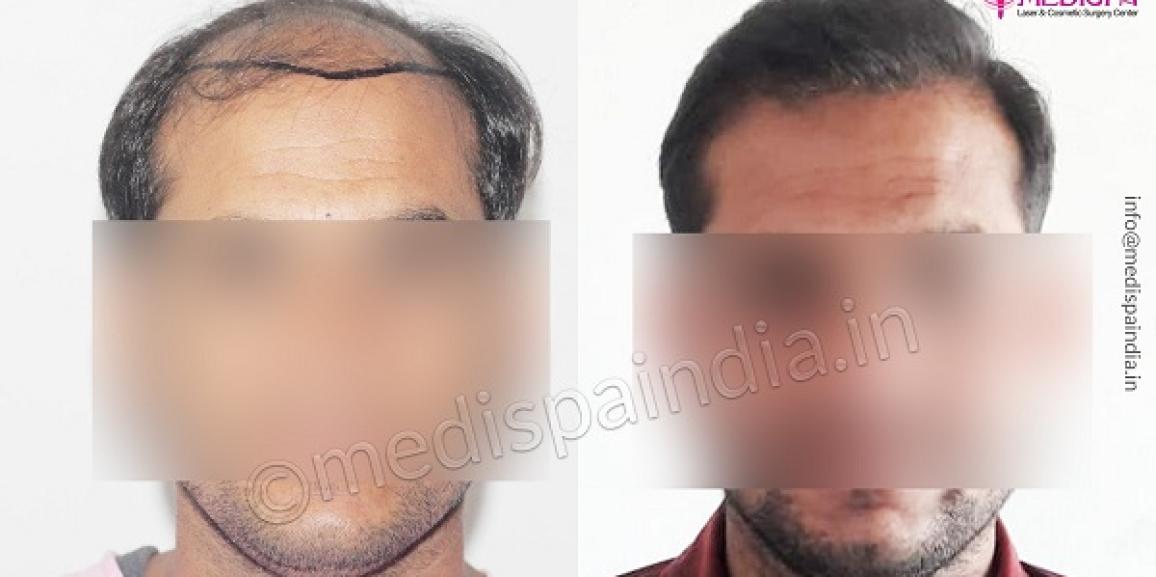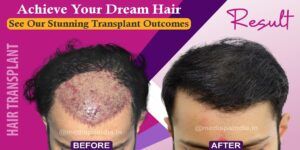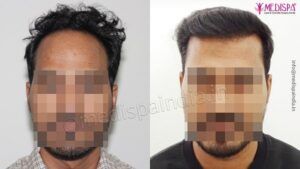
The hair transplant in Jaipur is now widely accessible as a result of its rising popularity as a hair loss treatment option in Jaipur. Due to growing competition in the industry, the hair transplant cost in Jaipur has drastically dropped. Yet most clinics employ vague terminology to persuade customers, which could make them unhappy with the surgery.
As a result, prior to receiving treatment, it is now essential to understand a few things. At Medispa clinics, honesty and open communication are highly emphasised because they are necessary for generating both excellent and pleasant results. Dr. Suneet Soni is an expert hair transplant surgeon without a doubt, but he also believes in thoroughly outlining the process and laying forth realistic expectations before it is carried out. That has definitely paid off because we are one of India’s top hair transplant clinics.
Hair transplant cosmetic surgery
Hair follicles are transferred from a donor area selected for its hair density to the bald spot in the recipient area during a restorative, minimally invasive operation called a hair transplant. It is a highly precise cosmetic procedure that requires significant knowledge and expertise.
What happens before hair transplant?
So let’s discuss the crucial procedures followed to get ready for a successful hair transplant:
- Systemic condition assessment: In order to get the best outcomes, the underlying reason of hair loss must be identified. Hair transplant doctors advise blood tests and other medical tests at the initial consultation before deciding whether to perform a hair transplant on a particular patient in order to ascertain the patient’s systemic condition and establish the viability of a hair transplant. If the patient is older than 40 years, an ECG is taken to evaluate the heart’s proper function. The surgeon should be informed of any allergies or skin conditions, for example.
- Medication: Before the treatment, the hair transplant surgeon should be informed of any medications the patient is currently taking. Anti-inflammatory, antidepressant, antibiotic, and blood thinner medications are just a few of the ones that need to be stopped before having a hair transplant. The doctor’s approval is required to cease using these drugs.
- Smoking and drinking: Smoking and drinking have a negative impact on the recovery from hair transplant surgery. It is required to stop taking them one week prior to the surgery and for one week afterwards.
- Hair maintenance: Before getting a hair transplant, you should take good care of your hair and wash it once every two to three days. Avoid getting your hair trimmed or coloured because trimming is done during surgery. To prevent dandruff, patient should abstain from using excessive amounts of hair products.
- Diet: A balanced, nutritious diet should be followed both before and after the hair transplant treatment by the patient to speed up recovery. Better hair regrowth is facilitated by a diet high in vitamin C, vitamin D, vitamin E, zinc, iron, and protein.
What happens during hair transplant?
While performing a hair transplant, a highly qualified and certified plastic or cosmetic surgeon should follow the steps below:
- Administration of local anaesthesia: Local anaesthesia is administered before the grafts are harvested at the donor and recipient locations. During the duration of the treatment, a combination of anaesthetic medications developed by Dr. Soni need only be administered once; additional doses are not required. The combination anesthetic’s effects last for over 12 hours.
- Grafts are obtained from the donor site
The following harvesting techniques distinguish between the two basic hair transplant techniques:
FUT hair grafting (Follicular unit transplantation or strip technique)
FUE hair transplant (Follicular unit extraction)
- Slitting the recipient area: This is done after follicular grafts have been extracted from the donor area using either technique. It prepares the implantation site for transplantation. Because the way the slitting is done effects how the output will look, this process needs to be done carefully. It requires sufficient specialised expertise and a sense of art to successfully cut the implantation site in order to produce the most natural effects, which cannot be figured out by anyone.
- Hair root transplantation: Following slit preparation, the follicular grafts are then implanted at the selected recipient location in the prepared slits. The positioning, alignment, and angulations of the follicular grafts are carefully considered to achieve natural-looking results from the hair transplant.
What happens after hair transplant?
Healing after hair restoration cosmetic surgery
Due to the minimally invasive nature of the hair transplant procedure, there is no postoperative morbidity. After the surgery, the patient can resume normal activities, however it is still advisable that they rest for the remainder of the day and resume the following day. By using FUE and FUT hair transplant procedures, the donor area heals in 7–10 days on average.
By a week, the recipient site has fully healed, and the flakes that had formed around the transplanted hairs have begun to fall off.
Visible changes and hair growth following cosmetic hair surgery
The hair transplant process is frequently mistakenly thought of as one that produces results instantly. But, in practise, it takes months to see the necessary growth and apparent changes.
It is usual for the transplanted hairs to experience shedding after a few days, and the bald area resumes its previous appearance. Within three months, there are noticeable alterations along with sparse hair growth. You can see new hairs on the bald spot after six months. The full growth is visible 9 to 12 months following the treatment, at which point you may see the procedure’s successful conclusion.







